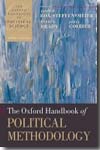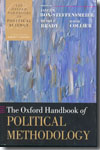The Oxford handbbok of political methodology
- ISBN: 9780199286546
- Editorial: Oxford University Press
- Fecha de la edición: 2008
- Lugar de la edición: Oxford. Reino Unido
- Colección: Oxford Handbooks of Political Science
- Encuadernación: Cartoné
- Medidas: 25 cm
- Nº Pág.: 894
- Idiomas: Inglés

Political methodology has changed dramatically in the past thirty years. Not only have new methods and techniques been developed, but the Political Methodology Society and the Qualitative Methods Section of the American Political Science Association have engaged in ongoing research and training programs that have advanced both quantitative and qualitative methodology. The Oxford Handbook of Political Methodology is designed to reflect these developments.It provides comprehensive overviews and critiques of all the key specific methodologies. The volume emphasises three things. Firstly, techniques should be the servants of improved data collection, measurement, conceptualization, and the understanding of meanings and the identification of causal relationship in social science research. Techniques will be described with the aim of showing how they contribute to these tasks, and the emphasis will be upon developing good research designs-not upon simply using sophisticated techniques.Second, there are many different ways that these tasks can be undertaken in the social sciences through description and modeling, case-study and large-n designs, and quantitative and qualitative research. Third, techniques can cut across boundaries and be useful for many different kinds of researchers. The chapter authors ask how their methods can be used by, or at least inform, the work of those outside those areas where they are usually employed. For example, those describing large-n statistical techniques should ask how their methods might at least inform, if not sometimes be adopted by, those doing case studies or interpretive work, and we want those explaining how to do comparative historical work or process tracing to explain how it could inform those doing time-series studies.
Eds. Janet M. Box-Steffensmeier, Henry E. Brady, David Collier








